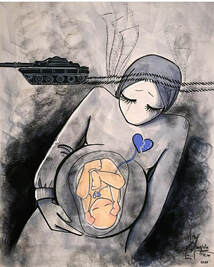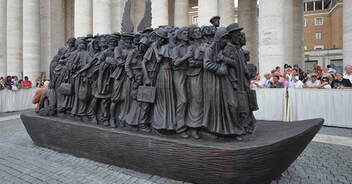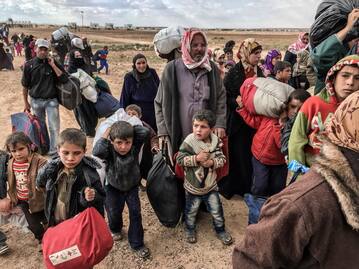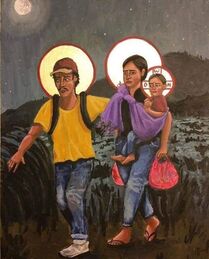 Kabul maternity hospital attack, May 2020 Shamsia Hassani artist Kabul maternity hospital attack, May 2020 Shamsia Hassani artist 30,600 people were uprooted every day in 2020. *Source Be silent for a moment and consider: Have you ever been in a situation where you knew everything was likely to change in a moment, but you had little to no control over when or how it would happen? How did you feel? It is very easy to take safety and stability for granted when we have it. But those who have lived through war, terror, deep poverty, displacement, or family or community break-down know the fear and uncertainty of everything being thrown into chaos in a moment. There are millions of people around the world living with the knowledge that any day, any minute, they might have to gather their family, grab what they can, and leave behind everything they know. We have already seen how Mary and Joseph had to journey from Nazareth to Bethlehem to register for Caesar’s census. Then comes a sentence which is easy to overlook when we read it but impossible to ignore in real life: “And while they were there, the time came for her to give birth.” (Luke 2:6) Women in late-stage pregnancy often hear and repeat the phrase: “Any day now!” And when the time for labour comes, it comes, and there is no stopping it. From that moment on everything changes in the short-term and long-term. It is normally a joyous occasion, but it is also fraught with uncertainty, fear, and pain. It is a marvel that the Author of Creation entered the world through such a normal, yet frightening and dangerous, process as childbirth. Think of it: Mary’s water broke, she started getting contractions, the child she had been awaiting for nine months – and that Creation had been anticipating for much longer – was suddenly on his way, and everything was about to change. Jesus’ birth was at the same time the most commonly experienced thing amongst all humans, and the most unique thing to every happen. Each of the 30,600 people who were uprooted each day in 2020 experienced something both increasingly common and entirely unique. They may have been waiting anxiously for it to happen, may have planned their exit for months, or it may have come upon them with the suddenness of labour pains. But their lives changed in that moment. Read: Luke 2:1-7 Prayer: Sit in silence for a minute. Reflect on the fact that roughly 30 people are newly uprooted every minute. Consider what such an “uprooting” would look like in your life. Pray that uprooted people would know the comfort of Jesus in their transitions. Pray that your faith would be strengthened to carry you through life’s transitions, and to be a help to others who have been newly uprooted.
0 Comments
 "Angels Unaware" Sculpture by Timothy Schmalz "Angels Unaware" Sculpture by Timothy Schmalz 11 million people were newly displaced in 2019. This includes 8.6 million internally displaced people and 2.4 million new refugees and asylum seekers. *Source Be silent for a moment and consider: have you ever been faced with a situation that felt entirely beyond your capacities, and that didn’t look like it was going to get better any time soon? How did it feel? What did you do? The crisis of people being displaced due to war, terror, or economics is not a new one, nor is it going away. Millions of people left their homes in fear in the past year, and millions more will almost certainly have to do so next year as well. As aid agencies and host nations try to help settle and stabilise the displaced people who are already on the move, they are under the pressure of knowing that more people are soon on their way. In John 1 we are introduced to the God who moves towards us. “In the beginning was the Word,” that is, God’s self-revelation. This Word of God becomes flesh and moves into the neighbourhood. Jesus is willingly displaced from heaven and comes to his creation, not out of fear, but because of love. God is always moving towards us. His movement wasn’t just something that happened 2000 years ago. Remember, Jesus is the Word of God, God’s self-revelation. His life demonstrates what God is always like. He is the Hound of Heaven, hunting us down all the time. At Eugene Peterson’s funeral his son said that his father only had one sermon, one prayer, and that he repeated it in every book and every conversation: “God loves you. He is on your side. He is coming after you. He is relentless.” When we are faced with situations that appear beyond our resources, that have no end in sight, and that look to only get more difficult before they get better (if they ever get better), remember this: God is on the move, too. He is on our side. He loves us. Read: John 1:1-5, 14 Prayer: Ask the Lord how you could best welcome a newcomer – be they internally displaced, a refugee or an asylum seeker, into your neighbourhood in the next year. Then ask the same question to a local agency that is helping to settle newcomers in your city.  Millions of forcibly displaced people Millions of forcibly displaced people “79.5 million people have been forced to flee their homes because of persecution, conflict and/or human rights violations.” This is the highest number ever recorded. The number of forcibly displaced people in the world has increased by more than 50% since 2007. *Source Be silent and consider that number. How does it compare to the size of your Church? Your city? Your country? The population of the world? 79.5 million is a shockingly large number of people who are not safe in their homes all around the world. Set against the number of people we meet in our daily interactions this number is overwhelming. Yet it is not actually an impossibly large number, especially when compared to the population of the world. It is possible for us to conceive of ways to welcome, house and help displaced people. The space and the resources are in fact available around the world. It becomes more difficult to imagine this, however, when we think of refugees and displaced people as a “faceless mass”, a “mob” or “invasion”. Numbers can be dangerous. Jesus’ parents were caught up in a numbers game. “In those days a decree went out from Caesar Augustus that all the world should be registered. This was the first registration when Quirinius was governor of Syria. And all went to be registered, each to his own town.” (Luke 2:1-3) Caesar caused the known world to get up and move in order to tax them. But he could not know that in so doing he was helping fulfill a prophecy that the Messiah would be born in Bethlehem. Mary and Joseph were just two of many people forced to travel by this decree, but they were of eternal significance. They weren’t lost in the “mob”. They mattered. So it is with every single one of the 79.5 million displaced people in our world. So it is with you, too. God knows every single one of us by name and circumstance, and he loves us. We are not faceless to him. And each of us are more significant to him than the whims of Empire that continue to cause displacement. Read: Luke 2:1-7 Prayer: Find a news source talking about refugees, and search for the name of an individual or family mentioned in the story. Pray specifically for that one person or family today. Pray that they would be brought to safety and know the love of God. Continue to pray for them for the rest of the Advent season. by Aaron White, 24/7 Prayer Canada  "Refugees la sagrada familia" Artist: Kelly Latimore "Refugees la sagrada familia" Artist: Kelly Latimore Jesus is in the caravan. It is 2021, and life is as hard for migrants, refugees, and displaced people as it has ever been. Many borders are closed, agencies are hard-pressed to help, and even our neighbours are suspected of being dangerous to us, let alone strangers from other lands. Politicians continue to inflame fears against foreigners and refugees to provoke anger against their political foes. We tend to pay attention when things are sensationalised or politicised, but then our attention moves on to other things. But refugees are not political leverage or media fodder. The stories of the millions of internally displaced persons and asylum seekers all around the world story haven’t ended just because our attention has been diverted. Each displaced person is a beloved child of God, made in His image, intimately known. And Jesus is present with them. Advent is a time in the Christian calendar when we remember the incarnation of Jesus and prepare for his return. The story of Jesus’ birth - well-worn through Nativity plays, Christmas carols, and seasonal television specials - seems overly-familiar. But perhaps the actual Biblical story is less familiar to us than we think. If we celebrate the forced journey of Jesus’ family from Nazareth to Bethlehem; sing about mysterious wise men from the East causing political unrest in Jerusalem; and read about the violent policy that forced the holy family to escape to another land; but fail to see how this might connect to the 82.4 million displaced people in our world today, then perhaps we really haven’t understood the story as well as we should. Scripture is consistent in its view of how the people of God are to receive orphans, widows, and strangers. "Do not neglect to show hospitality to strangers..." (Heb 13:2) "God executes justice for the fatherless and the widow, and loves the sojourner, giving him food and clothing. Love the sojourner, therefore, for you were sojourners in the land of Egypt." (Deut 10:18-19) Jesus became the ultimate sojourner, taking on human flesh not in comfort and security but under threat and displacement. If we can believe that Jesus is present in our worship services and around our family tables, then we must be able to imagine Jesus on the road with people who have lost everything, a situation Jesus and his family knew first-hand. Mary and Joseph sought shelter when they arrived in Bethlehem for the birth. People from all over the world are still looking for shelter and welcome as they arrive in our communities at increasing rates. There are things we can do to receive them well.
Pray:
|
WELCOME!
Our vision is to help people survive and recover from forced displacement. We do this together with the church, both globally, and locally in Canada. Archives
May 2024
Categories |
ABOUT IAFR.CA |
OPPORTUNITIES |
AFFILIATES
|
CONTACTIAFR Canada
374 Sheppard Ave E Toronto, ON M2N 3B6 [email protected] Please Note: IAFR Canada does not sponsor people to resettle in Canada. You may want to contact one of Canada's sponsorship agreement holders. |
|
*IAFR Canada is a distinct organization from IAFR USA
All photos on this website are by IAFR unless otherwise noted |
© 2020 International Association For Refugees Canada

 RSS Feed
RSS Feed